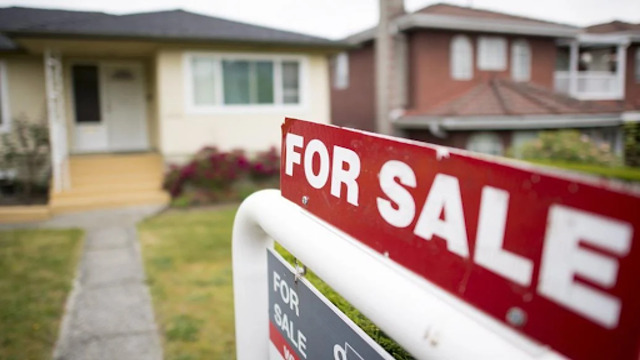
A 20 per cent home-flipping tax tops the list of a number of new regulations coming into effect in British Columbia starting Jan. 1. A for sale sign is pictured in Vancouver, B.C., Tuesday, June, 12, 2018. THE CANADIAN PRESS Jonathan Hayward
VICTORIA — British Columbia is ringing in 2025 with new regulations, including a maximum 20% home-flipping tax, as part of measures aimed at housing affordability and economic development. The provincial government has also announced a middle-income tax cut slated for the coming months and a planned carbon tax increase in April.
Premier David Eby emphasized the government's commitment to addressing issues central to B.C. families in the new year. “I’ve heard from you that we need to focus on the challenges you and your family discuss around the kitchen table,” Eby said in a statement. “That’s where our attention will be for 2025 and beyond.”
During the recent election campaign, Eby pledged to prioritize economic growth and affordability. He reiterated those promises in a year-end interview, highlighting the introduction of a middle-class tax cut as a key initiative. The tax cut, expected to provide rebates of up to $1,000 for households and $500 for individuals in 2025, will later expand to exempt an additional $10,000 of annual income from provincial tax.
"We are focusing on growing our economy and ensuring affordability," Eby said, adding that the newly established Ministry of Infrastructure will play a central role in driving development. “This ministry will streamline project approvals and prioritize essential infrastructure like schools, hospitals, and transit systems, ensuring we build a strong foundation for the province.”
Despite these promises, opposition finance critic Peter Milobar expressed skepticism about the pace of implementation. He criticized the premier for delays in delivering the tax relief promised during the election. “David Eby could have recalled the legislature last November to deliver immediate relief,” Milobar said. “We’re still waiting to see if February will finally bring action.”
Milobar also highlighted the forthcoming increase in the carbon tax, set to add 3.3 cents per litre to gasoline prices starting April 1. “Families are facing permanent carbon tax hikes while the government touts temporary cost-of-living measures,” he said, questioning the NDP’s commitment to affordability.
Finance Minister Brenda Bailey defended the government’s approach, stating that efforts are being made to cushion the impact of inflation. “The federal government mandates the carbon tax, but we ensure support for B.C. residents through climate action tax credits, which provide $600 annually to the average family,” Bailey said. “And there’s more to come.”
Currently, the carbon tax in B.C. stands at nearly 18 cents per litre, with the increase in April expected to push it above 20 cents.
The new home-flipping tax, effective January 1, aims to deter speculative investments by imposing a levy on non-exempt individuals who sell homes within two years of purchase. Exceptions will be made for circumstances such as divorce, job loss, or changes in household composition. Revenue from the tax, projected to affect about 4,000 properties annually, will fund affordable housing initiatives.
Other changes taking effect include a reduced maximum annual rent increase of 3%—down from 3.5%—and new measures to reduce methane emissions in the oil and gas sector. Additionally, buyers of qualifying purpose-built rental housing may benefit from a property tax exemption.
Later this month, eligible residents will receive payments from the quarterly climate action tax credit, alongside a temporary 25% cost-of-living bonus as part of the government’s broader efforts to address affordability challenges in the province.















